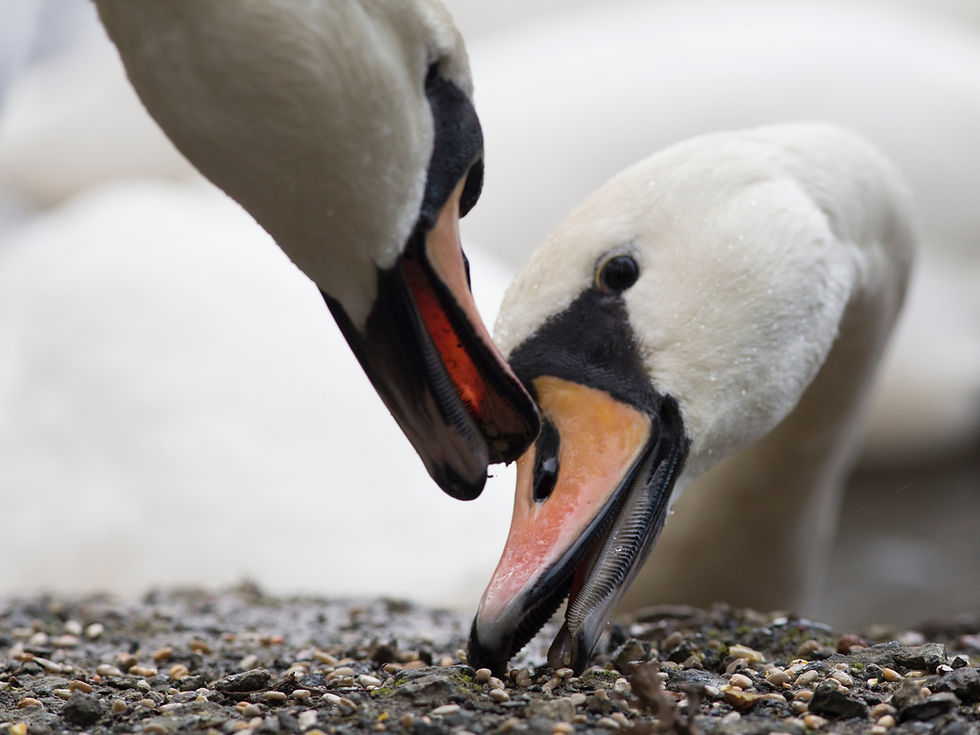Myth vs. Fact: Is Bread and Milk Really That Bad For Wildlife?
- Asha Park

- Jul 8, 2025
- 3 min read
Updated: Sep 9, 2025

Feeding wildlife is a wonderful way to support them, but not all human foods are safe for them. In fact, some common items can cause serious health issues or even be fatal. Bread, for instance, is a popular but poor choice for ducks — it fills birds up without providing the nutrients they need, leaving them malnourished. Milk can also be extremely deadly to most wild animals including hedgehogs.
In this blog let's explore feeding best practices!
Here are 10 foods to avoid;
Bread – Fills birds up but lacks essential nutrients, leading to malnutrition. Surplus bread left outside can go bad and make animals sick.
Spoiled Seed – Can develop mould and bacteria, spreading disease.
Pesticide-Treated Produce – Chemicals are toxic and can harm bird health and reproduction.
Crisps – High in saturated fat and salt; contributes to obesity and poor nutrition.
Fruit Pips & Seeds – Contain cyanide compounds; toxic to birds (e.g., apple seeds, cherry pits).
Milk – Many wild mammals are lactose intolerant and can’t digest dairy properly. Wildlife rehabbers use special formula.
Avocado – Contains persin, a toxin dangerous to many bird species.
Raw Meat – Spoils quickly and carries bacteria; not safe for birds.
Salty Foods – Disrupts fluid balance; can cause dehydration and kidney issues.
Chocolate – Contains theobromine and caffeine; highly toxic and potentially fatal.
Fact: Feeding bread and milk to wildlife can lead to digestive issues, malnutrition, and long-term health problems. Use wildlife-friendly and natural sources of food instead.

Natural Food Sources Are Best
Supporting Wildlife Starts with Knowledge
Wild animals have evolved to thrive on a natural diet specific to their species. Whenever possible, the best way to help is to protect and restore natural food sources:
Plant native shrubs and wildflowers to attract insects and provide seeds and berries.
Avoid pesticides and chemicals that can kill off invertebrates and poison wildlife.
Provide access to clean water year-round, especially during heatwaves and cold spells.

Safe Supplementary Feeding: What to Offer and What to Avoid
If you wish to support your local wildlife with supplementary food, here are safe and healthy guidelines:
Ducks and Swans:
✅ Good: Frozen peas, sweetcorn, chopped salad or sliced grapes.
❌ Avoid: Salted snacks, sugary cereal, or bread.
Garden Birds:
✅ Good: Sunflower hearts, nyjer seeds, fat balls (no plastic nets), mealworms (in moderation), fruit like apple or pear slices.
❌ Avoid: Bread, salty nuts, lard based fat balls, and cooked leftovers.
Hedgehogs:
✅ Good: Wet or dry cat/dog food (meat-based, not fish), specialist hedgehog food.
❌ Avoid: Milk, bread, mealworms (in large quantities), peanuts (unbalanced calcium/phosphorus ratio).
Foxes:
✅ Good: Raw or cooked meat in , eggs, unsalted peanuts, fruit (e.g., berries).
❌ Avoid: Processed or salty food, chocolate, grapes, onions.
Squirrels:
✅ Good: Unsalted nuts in shells (e.g., hazelnuts), chopped apples, carrots.
❌ Avoid: Salted snacks, sugary cereal, or bread.
Quick Tips: Always offer food in small amounts and at irregular times to discourage dependency. Clean up leftovers to prevent attracting predators such as cats or spread of disease. Buy species-specific specialised food from reputable and safe retailers.

Injured or Orphaned Wildlife – Don’t Feed Unless Advised
If you find a sick, injured, or orphaned animal, your instinct might be to offer food or water—but this can seriously impact their recovery.
Some animals may aspirate (inhale) liquids, leading to fatal pneumonia.
Others may be in shock or suffering internal injuries that feeding could worsen.
Inappropriate food can cause digestive issues, bloat, or toxic reactions.
TOP TIP: Keep the animal warm, quiet, and contained, and contact a wildlife rescue centre like Brent Lodge as soon as possible.
How You Can Help Wildlife the Right Way
Make your garden wildlife-friendly with native plants, water sources, and shelter.
Offer the right food in moderation, especially during winter or droughts.
Avoid harmful myths like feeding milk or bread.
Always seek advice before feeding rescued or orphaned wildlife.
Feeding wildlife can be rewarding—but only if done responsibly. By making informed choices, you can play a real part in helping our precious wild neighbours thrive.
By Asha Park




About game Football Bros, its bright visuals, goofy animations, and fast reactions create a playful atmosphere that feels perfect for both casual fun and friendly challenges.